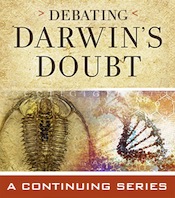 Faith & Science
Faith & Science
 Intelligent Design
Intelligent Design
From The New Yorker, More Malarkey on Darwin’s Doubt

An initial review of Darwin Doubt appeared in The New Yorker back in July soon after the book came out. Though author Gareth Cook dismissed ID largely based on Nick Matzke’s review at Panda’s Thumb — the one Matzke claimed to have completed in the course of a single session on the elliptical machine at his gym* — Cook’s review was also replete with backhanded compliments. Now there comes along Adam Gopnik in the same magazine with a long, silly essay ("Bigger than Phil") thumping for atheism. His remarks on Stephen Meyer and intelligent design make Cook and Matzke look judicious and thoughtful.
Actually, Gopnik wrote a couple of months ago and I missed it. I caught up with him only after skimming some recent posts by Jerry Coyne, cheering for Gopnik and razzing another writer, the widely lionized theologian David Bentley Hart, whose recent book is bashed in the same article.
Writes Gopnik:
Expert defenders [of religion] are more and more inclined to seize on the tiniest of scientific gaps or to move ever upward to ideas of God so remote from existence as to become pure hot air. Stephen C. Meyer’s best-selling "Darwin’s Doubt" (HarperOne) reinvents the God of the Gaps — a God whose province is whatever science can’t yet explain — with a special focus on the Unsolved Mysteries of the Cambrian explosion. Experience shows that those who adopt this strategy end up defending a smaller and smaller piece of ground. They used to find God’s hand in man’s very existence, then in the design of his eyes, then, after the emergence of the eye was fully explained, they were down to the bird’s wing, then they tried the bacterial flagellum, and now, like Meyer, they’re down to pointing to the cilia in the gut of worms and the emergence of a few kinds of multi-cellular organisms in the Cambrian as things beyond all rational explanation. Retreat always turns to rout in these matters.
 That has got to win some sort of prize for uninformed commentary on Darwin’s Doubt. There is nothing in Meyer’s book about "cilia in the gut of worms." And the "few kinds of multi-cellular organisms" that "emerged" are actually the majority of known phyla of the animal kingdom that have ever appeared in the fossil record, registering "unique animal forms and structures" and bursting on the scene some 530 million years ago without evident ancestral predecessors.
That has got to win some sort of prize for uninformed commentary on Darwin’s Doubt. There is nothing in Meyer’s book about "cilia in the gut of worms." And the "few kinds of multi-cellular organisms" that "emerged" are actually the majority of known phyla of the animal kingdom that have ever appeared in the fossil record, registering "unique animal forms and structures" and bursting on the scene some 530 million years ago without evident ancestral predecessors.
As for the God of the Gaps bit, it’s ironic that that forms much of the brunt of David Bentley Hart’s own critique of intelligent design, reflecting little more familiarity with ID than Gopnik evinces. In his book The Experience of God: Being, Consciousness, Bliss (Yale University Press), Hart writes off ID as worship as the "demiurge," a mere cosmic tinkerer, which is about as plausible a criticism as Stephen Meredith and John Derbyshire’s claim that ID is just reinvented "occasionalism."
It’s funny, Hart lashes atheists who criticize religion without their troubling to investigate theology, even as he criticizes ID without giving evidence of having troubled to learn much about it by investigating the arguments and evidence that ID scientists themselves offer.
The God of the Gaps criticism, in any event, has been answered many times, including by Stephen Meyer, extensively, in Signature in the Cell and Darwin’s Doubt. Neither Gopnik nor Hart seems aware of this. In Chapter 18 of the latter book, for example, Meyer writes:
Intelligent agents, due to their rationality and consciousness, have demonstrated the power to produce specified or functional information in the form of linear sequence-specific arrangements of characters. Digital and alphabetic forms of information routinely arise from intelligent agents. A computer user who traces the information on a screen back to its source invariably comes to a mind — a software engineer or programmer. The information in a book or inscription ultimately derives from a writer or scribe. Our experience-based knowledge of information flow confirms that systems with large amounts of specified or functional information invariably originate from an intelligent source. The generation of functional information is "habitually associated with conscious activity." Our uniform experience confirms this obvious truth.
The argument for ID follows from a negative observation, the known inadequacy of the Darwinian mechanism — and a positive one, the known adequacy of intelligence — to generate information of the kind needed to produce novel animal forms. It is not an argument from ignorance but an inference from what we already know. For a very brief treatment of this point, see Meyer’s reply to UC Berkeley paleontologist Charles Marshall ("Does Darwin’s Doubt Commit the God-of-the-Gaps Fallacy?") who reviewed Meyer (respectfully) in Science.
Meyer crystallizes the argument there as follows:
Premise One: Despite a thorough search and evaluation, no materialistic causes or evolutionary mechanisms have demonstrated the power to produce large amounts of specified or functional information (or integrated circuitry).
Premise Two: Intelligent causes have demonstrated the power to produce large amounts of specified/functional information (and integrated circuitry).
Conclusion: Intelligent design constitutes the best, most causally adequate, explanation for the specified/functional information (and circuitry) that was necessary to produce the Cambrian animals.
From Adam Gopnik we don’t hear a word about the centrality of genetic and epigenetic information to the case for ID in biology. More from Gopnik:
My own favorite atheist blogger, Jerry Coyne, the University of Chicago evolutionary biologist, regularly offers unanswerable philippics against the idiocies of intelligent design.
Unanswerable? Maybe because they are so totally devoid of even an attempt at substance. Despite writing a blog and a book called Why Evolution Is True, Coyne studiously avoids answering the major scientific challenge to Darwinian evolution. He’s liberal with insults, not so much with insights. Anyone who reads his work knows that. But Gopnik clearly has not read Darwin’s Doubt and I’m sympathetic to Hart’s complaint that he didn’t read The Experience of God either. If he praised the writing of Jerry Coyne, his "favorite atheist blogger," without actually being familiar with it, that wouldn’t surprise me.
*I exaggerate slightly. Matzke supposedly pulled off this wonder, writing a 9400+ word review of a 400+ page book, within hardly more than a day after the book went on sale.
I’m on Twitter. Find me @d_klinghoffer.
Photo: Adam Gopnik/Twitter.
